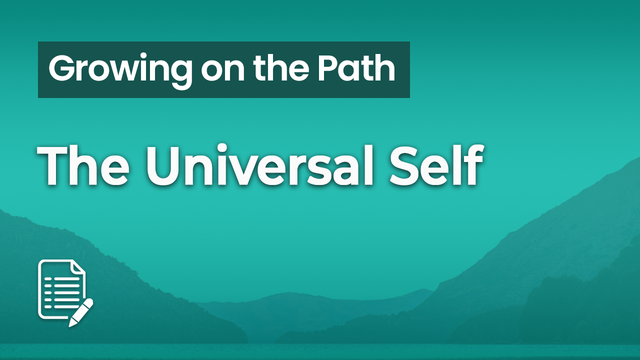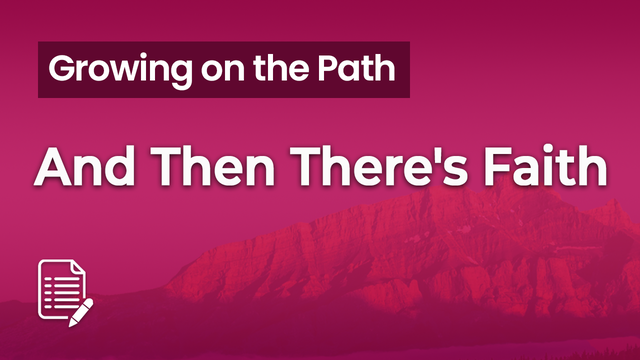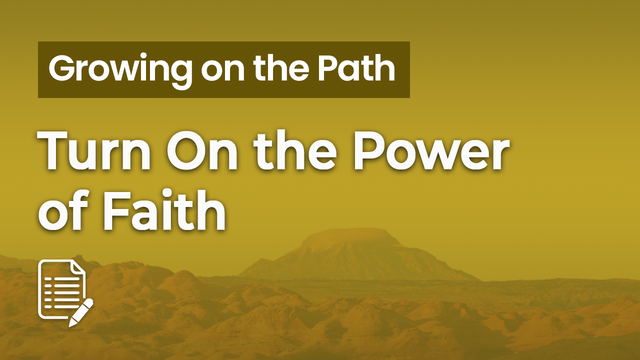
Ramakrishna Ananda
The Portal of Higher Consciousness
Want inspiration every day? Try good will meditations
With patient practice, and several repetitions (sometimes even immediately), the flow of your good will can bring you the following experience:
When your good will becomes steadily concentrated on your meditation object, you will become keenly aware. You’ll feel extremely wide awake. The feeling of your radiating good will becomes comforting and calming, very sweet. In this state the world out there begins to feel like a dream.
Your meditation object may remain clear to you or it may diffuse and leave you sitting there perfectly aware, perfectly concentrated. The world has begun to seem like a dream — free of any pressure, pain, or chaos, but you feel very real and more alive than usual. Your mind is clear and free of ideas. You feel no need to think other thoughts or labor your mind with other images. Yet you sense you are more conscious than usual. Thoughts themselves seem too slow, or perhaps too dreamlike in comparison with the quality of higher consciousness you sense so vividly.
This heightened consciousness abides for several minutes. It flows; it becomes continuous good will. You feel heavenly. No other thoughts or emotions intrude. You are in the Good Will Witness state, the portal of higher consciousness.
Life-Enriching Insights Become Possible
When you can enter the sublime Good Will Witness state easily, you can enjoy it in periods of reflection as well as meditation — meditation being a means of centering in your true nature, while reflection and contemplation focus on ideas, problems, and speculations. This “buddhi state,” as it’s often called, gives great insight for new inventions, compositions, works of art, solutions to personal and global problems. In most of civilization’s advances someone contacted the higher consciousness through the Good Will Witness state.
Depending on your temperament and development, depending on your skills and training, you will sense tremendous inspiration in areas which are important to you. You will perhaps sense musical themes or have direct perceptions — remember, not slow thoughts — direct perceptions of beautiful new works of art, or priceless ideas for new career opportunities. You might also gain amazing insights about how to deal with your daily problems, how to love more, how to overcome obstacles, or how to deal with problem people.
Meditate, Don’t Reflect
On no occasion, if you are able to abide in this borderland of higher consciousness, will negative emotions or worrisome thoughts bully you or flood your mind. If unpleasant thoughts or feelings do occur to you, you have been shot down from your high state temporarily, and you must once again patiently direct your good will toward the sublime state.
For your first few weeks, it’s best to focus on simply entering the Good Will Witness state. Try not to reflect upon your problems or seek specific inspirations while you’re in it. Meditate, don’t reflect.
You won’t be able to enter the state if you’re preoccupied with your problems or if you think of the buddhi only as a place for gathering up bits of information. First become able to enter the Good Will Witness plane of awareness at will. Always be appreciative of your access to this doorway of your higher consciousness. Many new seekers attest that when they take this state for granted or treat it only as a distribution center for personal flashes of wisdom, they soon find great difficulty in entering where they had so easily entered in their more appreciative days.
Beyond Thought
Consider also, while it’s essential to take time each day to think deep thoughts, Witness Consciousness is beyond thought. If you think you’re in the high Witness state but you’re thinking thoughts — even profound ones — you are not in a Witness state, nor in what is called higher consciousness. Beginners often assume they are superconscious when their fantasies or memories are more vivid than before. Remember, thoughts are too slow for higher consciousness. Higher consciousness expresses itself in direct perceptions, flashes of wisdom, which are later translated into words by the mind. But, bear in mind, as long as you are thinking in words you are in some part of your mind, not in higher consciousness. Your profound-sounding words may be valuable insights or they may be worthless, but you are not in the Good Will Witness State.
Also remember that — in being a beginner — your mind may occasionally translate a direct perception from the Witness state incorrectly. Insights from the Witness must be tested in the light of your day-to-day experiences. You learn through practice how to understand and cooperate with your Witness. You become able to distinguish between your flashes and your wishes.
Obstacles To Meditation
As you practice directing your good will toward your meditation object, avoid drowsiness. If you get drowsy — rather than extra-aware and relaxed — lie down to rest or get active by taking a walk or playing tennis. If you try to meditate while feeling sleepy or lazy, and do not maintain your flow of good will, you will allow old memories and subconscious impressions to float into your mind. Your desires will also surface if you’re sleepy or if you let your mind go blank. In fact, your desires to be great or important may become highly charged, glorious ego trips in which you think you’re having a bona fide vision of your greatness and leadership role among mankind.
When thoughts of your great importance or messianic mission float into your meditation they are almost always vivid personal desires from your subconscious — your mental/emotional storage basement. Inner voices and images which proclaim your greatness are not at all characteristic of the humbling and transforming awe which almost always fills you as you draw near true Witness awareness.
How Long Should You Meditate at First?
Abide in your meditation ten or fifteen minutes, preferably fifteen if you’re comfortable. Then slowly release the focus on your meditation object. With an attitude of good will (what else?), return your awareness to your body. Tense and relax your legs and arms. Rotate your head clockwise and counterclockwise, if you can do it comfortably.
Calmly sensing your residual good will, gaze around the room. Linger in the pleasantness. This is an excellent time to think about your daily problems in a calm, clear way. In maintaining your good will, you may find insights will spontaneously come from your higher consciousness out into your mental activity.
As mentioned before, your Good Will Witness state is also called the buddhi, which means the first stage of enlightenment.
May you regularly enter this exalted state of awareness through your thoughtfulness and your good will.
Reflectiom
Without Good Will
I can’t know anyone —
I’m even a stranger
To myself.




